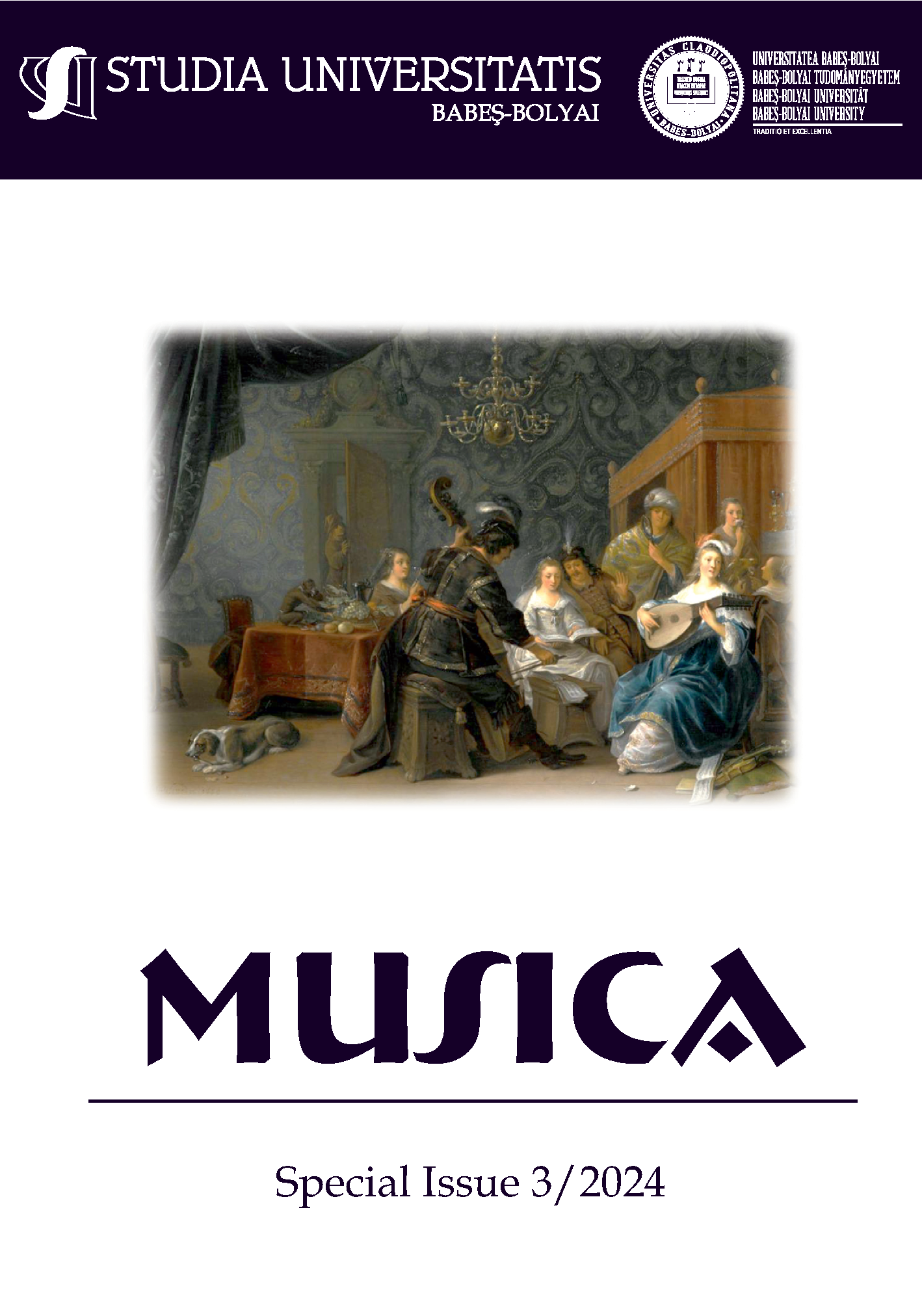Music Therapy Methods for Aphasia
DOI:
https://doi.org/10.24193/subbmusica.2024.spiss3.02Keywords:
Aphasia, Stroke, Music Therapy, Speech DisordersAbstract
Aims: The aim of the study is to give an overview of the known and less-known methods of music therapy for aphasia and to introduce the reader to our own developed therapeutic method based on folk singing, which is not yet internationally known but is already used in Hungary. Method: Articles from the Hungarian and international literature were studied for the research. We used the PubMed database, supplemented by a traditional library search. Results: We found 8 different aphasia therapy methods based on musical elements, targeting aphasic individuals with relatively good auditory speech understanding and impaired language expression skills. Each method was described as effective in improving some areas of impaired language and speech abilities. Our own therapeutic method has been found to be effective in improving word comprehension. Conclusions: The effectiveness of the methods described is known from measurements on relatively small groups of participants, and further research is needed.
References
Albert, Martin. L., et al. “Melodic Intonation Therapy for Aphasia.” In Archives of Neurology, vol. 29, no. 2, Aug. 1973, pp. 130–31.
Ferré, Gaëlle. Gesture, „Prosody and Verbal Content in Non-Fluent Aphasic Speech.” In Multimodal Communication no. 1, 2021, pp. 73–91.
Hartley, Meghan L., et al. “The Role of Music and Music Therapy in Aphasia Rehabilitation.” In Music and Medicine, vol. 2, no. 4, 2010, pp. 235–42. Johnson, Sarah B. “Therapeutic Singing.” Handbook of Neurologic Music Therapy, edited by Michael H Thaut and Volker Hoemberg, Oxford University Press, 2014, pp. 185–95.
Juhos-Kiss, Eszter, et al. “Zeneterapeuták Intézményi Jelenléte a Magyarországi Aphasiaterápiában”. (The Institutional Presence of Music Therapists in Aphasia Therapy in Hungary). In Orvosi Hetilap, vol. 164, no. 19, May 2023, pp. 747–52.
Juhos-Kiss, Eszter, and Henriette Pusztafalvi. “Az Afázia Zeneterápiája.” (Music Therapy of Aphasia).” VII. Zalaegerszegi Nemzetközi Egészségturizmus Konferencia. Absztrakt Kötet (VII. International Health Tourism Conference in Zalaegerszeg. Abstract Volume), edited by Tímea Csákvári and Zoltán Varga, Pécsi Tudományegyetem Egészségtudományi Kar, 2024, pp. 45–45.
Juhos-Kiss, Eszter and Pusztafalvi, Henriette. “Nyelvi És Beszédkészség Fejlesztése Énekeltetéssel Broca Afáziában. Színek Újratanulása. Esettanulmány” (Developing Language and Speech Skills through Singing in Broca’s Aphasia. Relearning Colours. Case Study).” In Parlando: Zenepedagógiai Folyóirat, 2022, https://www.parlando.hu/2022/2022-1/Juhos-Pusztafalvi.pdf. (accessed on 01. 08. 2024.)
Juhos-Kiss, Eszter and Pusztafalvi, Henriette. “Zeneterápiás Eszközök Alkalmazása Az Afáziaterápiában Hazai és Nemzetközi Kitekintéssel – Szakirodalmi Áttekintés (The Use of Music Therapy Tools in Aphasia Therapy with a Domestic and International Perspective - Systematic Review).” In Rehabilitáció: A Magyar Rehabilitációs Társaság Folyóirata, vol. 33, no. 1, 2023, pp. 3–10.
Kim, Mijin, and Concetta M. Tomaino. “Protocol Evaluation for Effective Music Therapy for Persons with Nonfluent Aphasia.” In Topics in Stroke Rehabilitation, vol. 15, no. 6, Nov. 2008, pp. 555–569.
KSH. Magyarország Népessége 2023-Ban (Population of Hungary in 2023). 2023, https://www.ksh.hu/stadat_files/nep/hu/nep0001.html. (accessed on 01. 08. 2024.)
Lim, Kil-Byung, et al. “The Therapeutic Effect of Neurologic Music Therapy and Speech Language Therapy in Post-Stroke Aphasic Patients.” In Annals of Rehabilitation Medicine, vol. 37, no. 4, Aug. 2013, pp. 556–562.
Mészáros, Éva. Mondatfeldolgozás Magyar Agrammatikus Afáziásoknál (Sentence Processing in Hungarian Agrammatical Aphasics). ELTE, 2007, http://doktori.btk.elte.hu/lingv/meszaroseva/diss_nem.pdf. (accessed on 01. 08. 2024.)
Norton, Andrea, et al. “Melodic Intonation Therapy.” In The Neurosciences and Music, vol. 6, 2009, pp. 431–436.
Pohl, Petra. “The Ronnie Gardiner Method: An Innovative Music-Based Intervention for Neurological Rehabilitation – Theoretical Background and Contemporary Research with Focus on Parkinson’s Disease.” In Neurophysiology and Rehabilitation, vol. 1, no. 1, 2018, pp. 32–37.
Pohl, Petra, et al. “The Ronnie Gardiner Rhythm and Music Method – a Feasibility Study in Parkinson’s Disease.” In Disability and Rehabilitation, vol. 35, no. 26, Dec. 2013, pp. 2197–204.
Raglio, Alfredo, et al. “Improvement of Spontaneous Language in Stroke Patients with Chronic Aphasia Treated with Music Therapy: A Randomized Controlled Trial.” In International Journal of Neuroscience, vol. 126, no. 3, Mar. 2016, pp. 235–42.
Schütz, Marika J. Can The Ronnie Gardiner Method Improve Language, Communication and Quality of Life For People with Aphasia? Jan. 2002, doi:10.13140/rg.2.1.2350.7442. (accessed on 01. 08. 2024.)
Sparks, Robert, et al. “Aphasia Rehabilitation Resulting from Melodic Intonation Therapy.” In Cortex; a Journal Devoted to the Study of the Nervous System and Behavior, vol. 10, no. 4, Dec. 1974, pp. 303–16.
Sparks, Robert W., and Audrey L. Holland. “Method: Melodic Intonation Therapy for Aphasia.” In Journal of Speech and Hearing Disorders, vol. 41, no. 3, Aug. 1976, pp. 287–97.
Szapáry, László. Stroke Napja 2019 (Stroke Day 2019). 2019, https://www.doki.net/tarsasag/stroke/info.aspx?sp=57&web_id=. (accessed on 01. 08. 2024.)
Szőcs, Ildikó, et al. “A Stroke-Ellátás Hazai Eredményei a Nemzetközi Adatok Tükrében (Domestic Stroke Care Outcomes in the Light of International Data).” In Orvosi Hetilap, vol. 157, no. 41, 2016, pp. 1635–41.
Thaut, Corene P; “Musical Speech Stimulation.” Handbook of Neurologic Music Therapy, edited by Michael H; Thaut and Volker Hoemberg, Oxford University Press, 2014, pp. 146–149.
Thaut, Michael H, et al. “Melodic Intonation Therapy.” Handbook of Neurologic Music Therapy, edited by Michael H; Thaut and Volker Hoemberg, vol. 6, no. 1, Oxford University Press, 2014, pp. 140–45.
Tomaino, Concetta M. “Effective Music Therapy Techniques in the Treatment of Nonfluent Aphasia.” In Annals of the New York Academy of Sciences, vol. 1252, Apr. 2012, pp. 312–17.
Văduva, Lois, and Catherine Warner. “‘Don’t Let Me Go’. A Case Study on Music Therapy in Early-Stage Dementia.” In Studia Universitatis Babeş-Bolyai Musica, vol. 66, no. 2, Dec. 2021, pp. 29–38.
Varga, Miklós, and György Geréb. “Az Aphasia Új Módszerű Kezelése (A New Way to Treat Aphasia).” In Pszichológiai Tanulmányok, 1958, pp. 289–302.
Zumbansen, Anna, et al. “Melodic Intonation Therapy: Back to Basics for Future Research.” In Frontiers in Neurology, vol. 5, 2014, pp. 1–11.
Downloads
Published
How to Cite
Issue
Section
License
Copyright (c) 2024 Studia Universitatis Babeș-Bolyai Musica

This work is licensed under a Creative Commons Attribution-NonCommercial-NoDerivatives 4.0 International License.



